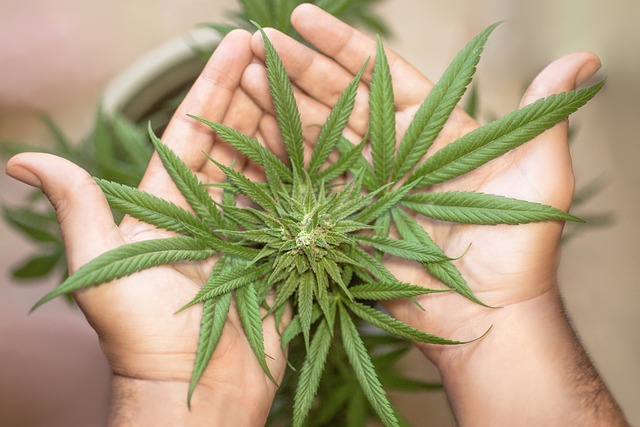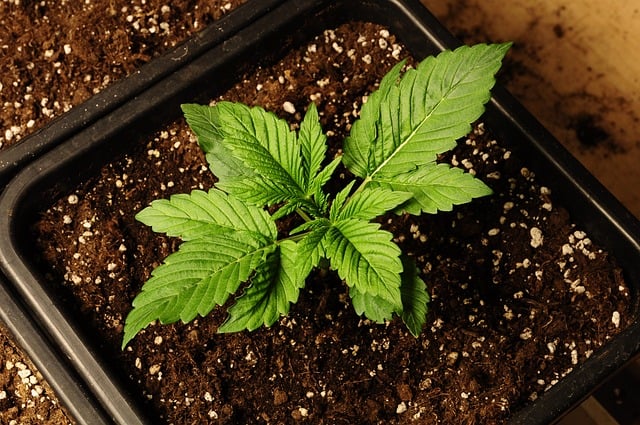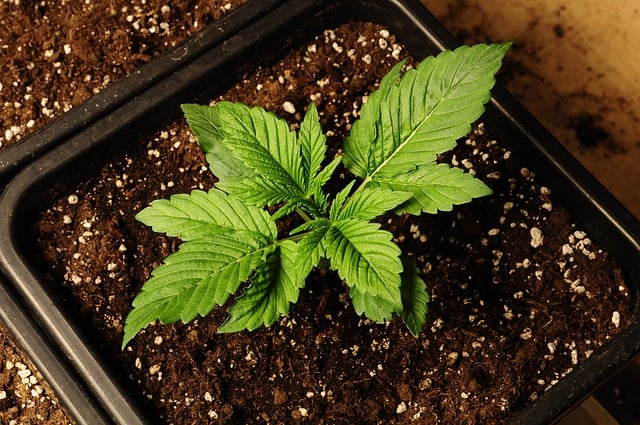THCA infused products, a non-psychoactive precursor to THC, are gaining popularity in the cannabis industry due to their potential health benefits, including anti-inflammatory and neuroprotective effects. These products, available in various forms such as oils, tinctures, edibles, and topicals, are being sold legally in some regions following cannabis legalization, while access remains limited in others due to varying regulatory frameworks. As THCA infused products for sale expand into the market, consumers are encouraged to understand both the therapeutic potential and safety profiles of these items, with a focus on responsible use and adherence to recommended dosages. While THCA itself does not cause psychoactive effects, it can convert into THC in the body, leading to potential psychoactive outcomes if improperly handled during production. Consumers should source products from reliable vendors for quality assurance and accurate labeling. Clinical trials are ongoing to further elucidate THCA's benefits and side effects, particularly its antiemetic and anti-cancer properties, and to ensure the safe use of THCA infused products for sale.
Exploring the burgeoning role of tetrahydrocannabinolic acid (THCA) infused products in wellness routines, this article delves into the multifaceted implications of THCA flower consumption. From its emergence as a key ingredient in market-available products to its potential therapeutic effects, we examine the legal status and user experiences that shape its availability and usage. A critical examination of the safety profiles will shed light on any side effects associated with this cannabinoid, ensuring informed decision-making for consumers interested in THCA infused products for sale. This comprehensive analysis also synthesizes current research to elucidate the known health implications and effects of THCA, providing a balanced view of its potential benefits and risks.
- Unveiling THCA Flower: A Closer Look at Its Emergence in Infused Products for Sale
- Understanding THCA: Potential Benefits and Mechanisms of Action
- The Legal Landscape: Navigating THCA Infused Product Availability Across Regions
- Safety Profiles: Assessing the Side Effects and Risks Associated with THCA Flower Consumption
- THCA Dosage and Experiences: A User-Centric Perspective on Usage Patterns
- Interpreting the Research: What Studies Say About THCA's Side Effects and Health Implications
Unveiling THCA Flower: A Closer Look at Its Emergence in Infused Products for Sale

Unveiling THCA Flower: A Closer Look at Its Emergence in Infused Products for Sale
The THC Acid (THCA) flower has gained significant attention within the cannabis industry, particularly with the rise of infused products hitting the market. THCA, the raw and non-psychoactive precursor to THC (Tetrahydrocannabinol), is being increasingly incorporated into various consumer goods due to its potential therapeutic benefits. These infused products for sale range from oils and tinctures to edibles and topicals, catering to a diverse spectrum of preferences and needs. The emergence of THCA in the market offers consumers an opportunity to experiment with cannabinoids at an earlier stage of processing, which proponents believe may offer different effects compared to traditional THC products. As regulations evolve and consumer demand grows, THCA infused products for sale are becoming more accessible, providing a novel option for those seeking the potential health benefits associated with cannabinoid use.
The growth in THCA infused products for sale is not just a testament to changing legal landscapes but also to the increasing body of research that suggests THCA may possess unique properties. These include anti-inflammatory, neuroprotective, and potential anti-cancer effects, although more human-based studies are needed to substantiate these claims. As such, the cannabis industry is abuzz with innovation, as companies explore the full spectrum of cannabinoids’ therapeutic potential. This has led to a surge in products that harness the power of THCA, ensuring its inclusion in formulations that aim to provide relief or enhance well-being without the immediate psychoactive effects associated with THC. With each new product, manufacturers are refining their processes and offerings, making THCA infused products for sale an intriguing addition to the cannabis landscape.
Understanding THCA: Potential Benefits and Mechanisms of Action

Delta-9-tetrahydrocannabinolic acid (THCA) is a non-psychoactive cannabinoid found in the Cannabis sativa plant, which is the scientific precursor to the more commonly known psychoactive compound delta-9-tetrahydrocannabinol (THC). THCA infused products for sale are gaining traction among consumers seeking the potential therapeutic benefits of cannabinoids without the intoxicating effects associated with THC. Research indicates that THCA may offer a variety of health advantages, including anti-inflammatory, analgesic, and neuroprotective properties. These benefits stem from THCA’s interaction with the body’s endocannabinoid system, particularly its receptors CB1 and CB2, which are involved in regulating pain, inflammation, mood, appetite, and memory.
Furthermore, studies suggest that THCA may contribute to the modulation of immune responses, offering potential benefits for conditions like arthritis and multiple sclerosis. Its anti-nausea effects are also well documented, making it a component of interest in pharmaceuticals aimed at alleviating chemotherapy-induced nausea and vomiting. Additionally, preliminary research has shown that THCA might possess antiemetic properties, which could be beneficial for individuals undergoing cancer treatment. The mechanisms by which THCA exerts its effects are complex and multifaceted, involving the modulation of various signaling pathways within the body. As such, THCA infused products are a subject of growing interest in both scientific research and consumer markets, with ongoing studies expected to shed more light on their potential applications and benefits.
The Legal Landscape: Navigating THCA Infused Product Availability Across Regions

Navigating the legal landscape of THCA infused products can be complex, as regulations vary significantly across regions. In some areas, THCA, or tetrahydrocannabinolic acid, a non-psychoactive compound found in the cannabis plant that is the precursor to THC, is gaining recognition for its potential wellness benefits, leading to the emergence of THCA infused products for sale. These products, ranging from edibles and topicals to capsules and vaporizers, are being marketed for their therapeutic properties without the psychoactive effects associated with THC. However, the legality of these offerings is subject to a patchwork of laws that depend on state or country regulations. In states where cannabis has been legalized for medical or adult recreational use, THCA infused products may be readily available in dispensaries. Conversely, in regions where cannabis remains strictly controlled or illegal, accessing these products can be challenging and sometimes risky. It’s crucial for consumers to stay informed about the specific laws in their jurisdiction, as compliance with local regulations is not only a legal requirement but also ensures consumer safety and protection from potential legal repercussions. The availability of THCA infused products for sale is an evolving area of the market, with new products and regions coming online as attitudes and laws toward cannabis continue to evolve.
Safety Profiles: Assessing the Side Effects and Risks Associated with THCA Flower Consumption

Though tetrahydrocannabinolic acid (THCA) is a non-psychoactive cannabinoid found in the hemp plant, it’s metabolite THC, which is psychoactive, becomes prominent when exposed to heat or light. As such, consumers interested in THCA infused products for sale must be aware of the potential side effects and risks associated with its consumption. Research indicates that THCA may offer therapeutic benefits without the ‘high’ typically associated with THC, making it a popular choice for those seeking wellness properties without psychoactive effects. However, like any substance, THCA flower can have adverse reactions in certain individuals. Common side effects include dry mouth and red eyes, which are generally mild and temporary. It’s also worth noting that while THCA is non-psychoactive, its transformation into THC within the body can lead to psychoactive effects if not used correctly, such as improper decarboxylation during preparation.
The safety profile of THCA infused products for sale is generally favorable, but potential users should approach these products with caution and due diligence. It’s crucial to purchase from reputable sources to ensure the product’s quality, purity, and accurate labeling of its cannabinoid content. Consumers must also consider their unique physiology and any pre-existing health conditions when incorporating THCA flower into their wellness routine. While THCA is considered safe for most individuals, its interaction with other medications should be carefully managed, and medical advice should be sought, especially for long-term use. Adverse reactions can include anxiety, paranoia, and acute psychotic episodes in susceptible individuals, underscoring the importance of consumer responsibility and education when it comes to THCA flower side effects and risks.
THCA Dosage and Experiences: A User-Centric Perspective on Usage Patterns

When incorporating THCA-infused products into one’s wellness routine, understanding dosage and individual experiences plays a pivotal role in optimizing the user’s perspective on usage patterns. THCA, or Tetrahydrocannabinolic Acid, is a non-psychoactive cannabinoid found in raw cannabis plants, which, when heated, converts to THC, the psychoactive compound well-known for its effects. As such, THCA infused products for sale offer a unique opportunity for users to experiment with the potential benefits of cannabinoids without the high typically associated with THC.
Users often report varying experiences based on their individual tolerance, the potency of the product, and their body’s specific physiological response. It is advisable to start with a low dosage to gauge how one’s body reacts to THCA, as effects can range from mild to significant. For those interested in exploring THCA infused products for sale, it is crucial to consider the product’s milligram strength and the recommended serving size, which can typically be found on the product label or accompanying information provided by the manufacturer. As with any new supplement, it is important to proceed cautiously, allowing time for the body to adjust before considering an increase in dosage. User experiences with THCA-infused products often highlight the importance of personalized dosing and the need for a patient approach to incorporating these products into one’s daily regimen. By adhering to user-centric principles and prioritizing individual experiences, users can better navigate their journey with THCA infused products for sale, ultimately leading to a more informed and tailored usage pattern.
Interpreting the Research: What Studies Say About THCA's Side Effects and Health Implications

Recent research on THCA, or tetrahydrocannabinolic acid, a non-psychoactive compound found in cannabis and hemp plants, has shed light on its potential side effects when used in various infused products for sale. Studies have indicated that while THCA is not psychoactive like its decarboxylated form THC, it exhibits a range of therapeutic properties. However, as with any substance, the body’s response to THCA can vary among individuals. Preclinical research in animal models has revealed that THCA may cause some side effects, such as lethargy and changes in blood pressure, when administered at high doses. Human clinical trials are necessary to confirm these findings and understand the full spectrum of THCA’s effects. The majority of current studies suggest that THCA infused products for sale can be well-tolerated by many users, particularly when used at appropriate dosages. However, it is crucial for consumers to approach these products with caution and consult healthcare professionals before incorporating them into their health regimen, especially given the lack of long-term human studies on its effects. As the market for THCA infused products expands, ongoing research will be pivotal in clarifying any potential side effects and providing clearer guidelines for safe and effective use.
In conclusion, the emergence of THCA flower as an ingredient in infused products available for purchase represents a significant development in the cannabinoid market. Understanding the potential benefits and mechanisms of action of THCA has shed light on its therapeutic prospects. However, it is crucial to approach THCA consumption with caution, as there are side effects and risks to consider, particularly when assessing dosage and individual experiences. The legal landscape varies widely, affecting the availability of these products across different regions. A careful examination of existing research indicates that while THCA offers promising benefits, potential adverse effects should not be overlooked. Consumers are encouraged to make informed decisions based on a comprehensive understanding of both the scientific data and the legal status of THCA infused products in their area. With continued research and regulatory clarity, users can better navigate the potential of THCA flower, ensuring safe and responsible use.
